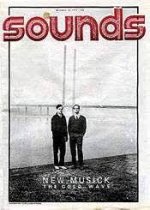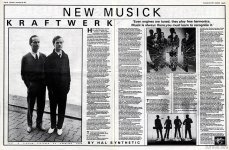Sorry, a bit of a hungover misunderstanding on my part...
I was just thinking about how sometimes genres get named in retrospect, that journalists looking to make a name for themselves are keen to discover and name a scene - I can remember when what we call "grime" was also called "8-bar", "grimy garage", "sub-low", "eski-beat", but it was "grime" that gained traction ..
I was just wondering if it was the same for "post punk"...and according to Wikipedia it was originally also referred to as "New Musick" in the contemporary music press, which is a bit of a shit name to be honest...
Ah well that is a funny one, because "New Musick" was the title of a two-part feature package in Sounds at the end of 1977, across two issues / two weeks, and involving Jon Savage, Vivien Goldman, Sandy Robertson, etc writing about all kinds of new directions coming out of punk (Banshees, Cabaret Voltaire etc), or things that they thought would be an
influence on the next direction (so Kraftwerk, disco, dub reggae, Throbbing Gristle etc). But in the intro, right at the start, Savage uses the word "post-punk" - as an adjective ("post-punk projections" - so he's saying these are my predictions about what's going to happen next, or my
hopes). But what starts as an adjective does tend to become a noun (e.g. "grimy" becomes "grime). So even as early as 1977, "post-punk" was a word beginning to circulate.
There was a period of "wot-you-call-it" semantic unfixedness - in 1978, people interchangeably use terms like New Musick, New Wave, postpunk, even the ungainly term after-punk had some proponents. But by about 1979 post-punk is pretty established as the term for "what we are now in the midst of, what's unfolding around us" - and it's becoming a noun, a very loose genre term. And by 1980 it's becoming a set of cliches - bands whose followers all wear grey overcoats (they used to call Joy Division's followers the Cult With No Name).
I vaguely remembered this from the actual time of living through in real-time, but when I did Rip It Up I trudged through the music papers chronologically 1977-83, and saw the term gradually creep into the discourse.





